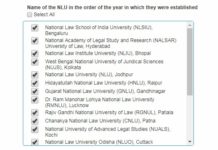 [I had the opportunity to interview Jaideep Singh Baccher,. Nalsar Class of 2009. After a two year stint at Amarchand he took the proverbial plunge by venturing into entrepreneurship. We have talked about the world beyond the ‘Who wants to be the next Amarchand Partner’ Race and Jaideep comes as a shining example from that world. A combination of intellect, wit, smartness, dedication and hard work, Jaideep, is the ideal person to give us a glimpse into what it is like to be doing something ‘different’ after law school. Presently he runs his own company the School Sports Programme, which is sure to reach the pinnacle of success. To find out more about the brilliant work that he is doing visit: http://www.schoolsportsprogram.com. – Sandipan De]
[I had the opportunity to interview Jaideep Singh Baccher,. Nalsar Class of 2009. After a two year stint at Amarchand he took the proverbial plunge by venturing into entrepreneurship. We have talked about the world beyond the ‘Who wants to be the next Amarchand Partner’ Race and Jaideep comes as a shining example from that world. A combination of intellect, wit, smartness, dedication and hard work, Jaideep, is the ideal person to give us a glimpse into what it is like to be doing something ‘different’ after law school. Presently he runs his own company the School Sports Programme, which is sure to reach the pinnacle of success. To find out more about the brilliant work that he is doing visit: http://www.schoolsportsprogram.com. – Sandipan De]
Amarchand and now. Difference?
In the near ten months since I quit Amarchand, I’ve started up a company, made it to the Hyderabad Ultimate Frisbee team, played a tournament with them and restarted playing the drums with a couple of bands in Hyderabad. I now play Ultimate and gigs twice a week. Oh and I also acted in a bunch of advertisements for a friend’s website. The difference is essentially having the time to do the things you enjoy doing.
Why entrepreneurship?
I’m often asked this question and my standard answer is ‘Why not’? Entrepreneurship doesn’t require a degree in business. Some of the biggest names in business didn’t even have a formal education. At some level I figured that rather than being a lawyer who works for big law and big businesses, I could try to be the big business. The time for taking the risk is when you’re young and still have the energy and not as many responsibilites. So like I said before, there’s no reason to not try it.
How suited or otherwise is a lawyer from a top National Law School to take up the mantle of being an entrepreneur?
There are two answers to this question. On the one hand I feel that law students across the board are furiously insulated from the real world and could do with a lot more exposure. Internships where most students faff around until their third year can be used more constructively and law students shold be given the option of not only exploright the legal side, but also the commercial side of companies. The good thing however is most students at these National Law Schools are some of the smartest in the country. They are undoubetdly brimming with ideas and just need to be given the right push for things to work out for them.
Where has your legal education helped?
Not much, really. I mostly have a few friends at NALSAR and my tenure at Amarchand to thank. Though his statement came under a fair bit of controversy some time last year, I agree with Jairam Ramesh when he said that the glory of an institution is built by its students and not its teachers. Conversations at NALSAR, even about the most banal topics were somehow much smarter than conversations with people outside. Amarchand on the other hand instilled a sense of discipline, hard work and professionalism; and even though the work hours were sometimes brutal I still look back at those days fondly because they taught me how organizations work and just how much I could push myself.
How does one hit upon an idea?
You don’t. When the time is right, the idea finds you.
When do you know the time is right?
There’s no real objective way of saying when the time for an idea is right. In my case, I made a conscious decision to quit Amarchand only after finishing two full years there. I did that as a back-up in case the company wouldn’t take off. Two years at the top law firm in India is sure to open doors for you pretty much anywhere.
Money Matters. Planning?
Planning is the most essential aspect of the entire entrepreneurship journey. Even the best idea will fall flat on its face without the right kind of planning. The other thing that you should do is to ensure that you ALWAYS have a back-up plan. Most lawyers are at an advantage in that respect because we have a law degree and can practice in court if nothing else. Money does matter, and frugality is the way to go. There’s no shame in admitting that apart from tht brand name, it was the idea of unseen riches that drew me towards corporate law. But at some level you have to take a call on whether you’re going to sacrifice on the high life for some time and work towards nurturing a dream. I made that choice and am a much happier person today.
Any plans for the future?
Plenty. SSP needs to have a presence in 100 schools across India and I am also in the process of germinating a couple of new companies. So its going to be a very interesting year. Future plans also include recording a full length album with my band and taking Ultimate Frisbee to NALSAR.
If not an entrepreneur then what would you have been doing now?
Given that it’s a Sunday, I would probably be proof reading a document in office :P. On a more serious note however, the dream was to do Masters degree called the Master of Arts in Law and Diplomacy from the Fletcher School of Law and Diplomacy at Tuft’s University. So probably that.
A Super Duper Senior’s gyan for a tweenie weenie law aspirant and CLAT taker.
Firstly, thanks for making me feel ridiculously old man!!
Go into law school with an open mind. There are things out there that are yet unexplored. And don’t let one exam judge your intelligence. That’s the worst thing that you can do to yourself. If you don’t get into your desired law school this year, take a year off and try again. There’s absolutely no harm in that. And for God’s own sake don’t be overly competitive in law school. There’s plenty of time for competition in the real world. Always remember, ‘Light lene ka, Delight mein rehne ka’
All the best!















“Conversations at NALSAR, even about the most banal topics were somehow much smarter than conversations with people outside.”
I’ve never had a conversation at NALSAR, but agreed. You guys are all so freakishly aware and smart.
An entrepreneur is an economic agent who unites all means of production- land of one, the labour of another and the capital of yet another and thus produces a product. By selling the product in the market he pays rent of land, wages to labour, interest on capital and what remains is his profit. He shifts economic resources out of an area of lower and into an area of higher productivity and greater yield.-..
With best thoughts
<http://healthmedicinelab.com